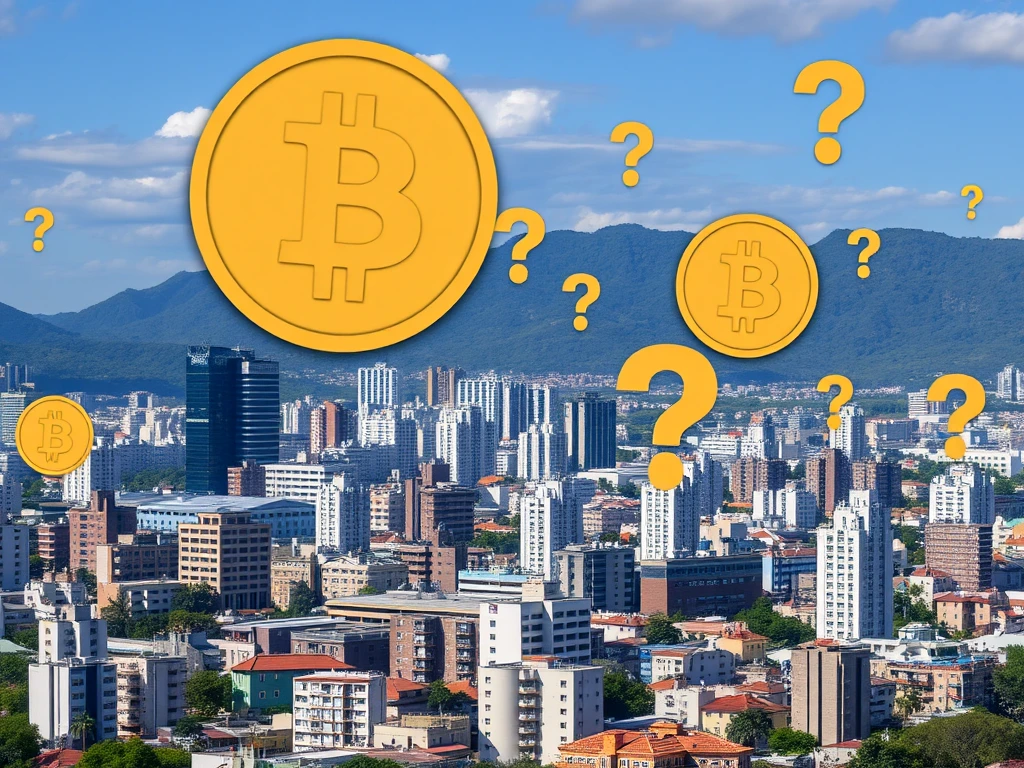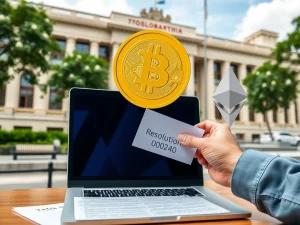Alarming Data: Only 11% of El Salvador Bitcoin Firms Operational Amidst Regulatory Hurdles

El Salvador’s bold move to embrace Bitcoin as legal tender captured global attention, positioning the nation as a pioneering hub for crypto innovation. However, recent data paints a less optimistic picture. Despite the initial buzz and registration of numerous Bitcoin service providers, a startlingly low percentage are actually operational. Is the dream of widespread Bitcoin adoption in El Salvador facing unexpected roadblocks? Let’s delve into the numbers and uncover the challenges behind this surprising statistic.
Shocking Stats: Only a Fraction of El Salvador Bitcoin Firms Are Operational
According to data from El Salvador’s Central Reserve Bank, a mere 11% of registered Bitcoin firms are currently operational. Out of 181 registered service providers, only 20 have managed to meet the stringent requirements set forth by the country’s Bitcoin Law. This means a significant 89% are classified as non-operational, raising questions about the practical implementation of El Salvador’s ambitious crypto agenda.
Local news outlet El Mundo highlighted these figures, revealing that the majority of non-operational firms have struggled to comply with the financial system supervision mandates stipulated by the Bitcoin Law. This law, intended to foster a regulated and secure crypto environment, appears to be inadvertently creating barriers for businesses aiming to operate within El Salvador’s Bitcoin ecosystem.
Decoding El Salvador’s Bitcoin Regulation: Why Firms Struggle to Operate
So, what exactly are these regulatory hurdles that are preventing Bitcoin firms from becoming operational in El Salvador? The Bitcoin Law in El Salvador outlines several key requirements for service providers, including:
- Anti-Money Laundering (AML) Program: Firms must establish and maintain robust AML programs to prevent illicit financial activities.
- Asset Record Keeping: Accurate and comprehensive records of company assets, liabilities, and equity are mandatory for transparency and accountability.
- Cybersecurity System: Implementing a tailored cybersecurity program is crucial to protect user data and assets, with the specific requirements depending on the nature of services offered.
These regulations, while designed to ensure the integrity and security of the Bitcoin ecosystem, seem to be proving challenging for many businesses to implement. The high non-operational rate suggests that navigating these compliance requirements may be more complex and resource-intensive than initially anticipated for many firms, particularly smaller ones.
Notable Exceptions: Firms Successfully Navigating El Salvador’s Bitcoin Landscape
Despite the overall low operational rate, some companies have successfully navigated the regulatory landscape and are operating within El Salvador’s Bitcoin framework. These include:
- Chivo Wallet: The state-backed digital wallet, central to El Salvador’s Bitcoin adoption strategy, is operational.
- Crypto Trading & Investment: This firm indicates that businesses focused on trading and investment can meet the requirements.
- Fintech Américas: Demonstrates that Fintech companies with a focus on the Americas can also successfully operate under El Salvador’s Bitcoin regulation.
These examples highlight that operational success is achievable, but likely requires significant investment in compliance infrastructure and expertise.
IMF Pressure and El Salvador’s Bitcoin Policy Crossroads
Adding another layer of complexity to El Salvador’s Bitcoin adoption journey is the influence of the International Monetary Fund (IMF). El Salvador recently secured a $1.4 billion loan deal with the IMF, which reportedly comes with conditions that impact its Bitcoin policies.
Under the agreement with the IMF, El Salvador has seemingly agreed to:
- Tax Payments in USD: Taxes will primarily be paid in US dollars, potentially limiting the use of Bitcoin for government revenue.
- Limit Public Sector Bitcoin Use: Public institutions will curtail their engagement with Bitcoin transactions.
- Halt Public Sector Bitcoin Buys: The IMF has explicitly requested El Salvador to cease public sector Bitcoin purchases.
While President Bukele has publicly stated that the government will continue to purchase Bitcoin, seemingly contradicting aspects of the IMF deal, the situation remains fluid. Speculation is rife about whether El Salvador might ultimately roll back Bitcoin’s legal tender status, especially with some reports suggesting a potential rollback law taking effect in late April.
The Future of Bitcoin Adoption in El Salvador: Challenges and Opportunities
The low operational rate of Bitcoin firms in El Salvador, coupled with IMF pressures, presents a critical juncture for the nation’s Bitcoin experiment. While the initial enthusiasm for Bitcoin adoption was high, the practical realities of regulatory compliance and international financial pressures are becoming increasingly apparent.
Challenges:
- Regulatory Burden: The stringent requirements of the Bitcoin Law are hindering the operational capacity of many firms.
- IMF Influence: Conditions attached to the IMF loan are pushing El Salvador to reconsider aspects of its Bitcoin policy.
- Economic Viability: The long-term economic benefits of Bitcoin adoption for El Salvador are still under scrutiny.
Opportunities:
- Regulatory Refinement: El Salvador could refine its Bitcoin regulation to be more accessible while maintaining essential security and AML standards.
- Attracting Compliant Firms: Focus could shift to attracting larger, more established crypto firms that have the resources to meet regulatory requirements.
- Innovation Hub: Despite the challenges, El Salvador still has the potential to become a hub for Bitcoin innovation if it can strike the right balance between regulation and fostering a business-friendly environment.
Conclusion: A Reality Check for Bitcoin Ambitions
The data revealing that only 11% of registered Bitcoin firms are operational in El Salvador serves as a stark reminder of the complexities involved in large-scale cryptocurrency adoption. While El Salvador’s pioneering spirit is undeniable, the path to becoming a thriving Bitcoin nation is proving to be fraught with regulatory hurdles and external pressures. The future of El Salvador’s Bitcoin experiment will depend on its ability to adapt its regulatory framework, navigate international financial relationships, and ultimately, create an environment where both innovation and compliance can flourish. The world is watching to see if El Salvador can overcome these challenges and truly unlock the potential of Bitcoin adoption.










